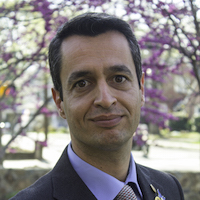Dilshad Jaff
May 4, 2015
.
For Master of Public Health candidate Dilshad Jaff, MBChB, war-zone health crises are more than 10-second sound bites on the evening news. As a Baghdad-trained physician, he was neck-deep in those crises and found them to be complicated and very real. Now solving them is his mission.
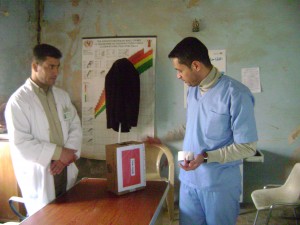
Between 2010 and 2013, Dr. Jaff regularly visited primary health-care centers in disputed areas of Iraq to support staff members. Here, at a rural center low on supplies, he devises a disposal box for used needles from an empty medicine box. (Contributed photo)
“The nature of conflict has changed, and things have become more complex,” says Jaff, who worked as primary health district manager under the Iraqi Ministry of Health from 2003 to 2008. “We can’t improve global health without looking at conflict and resolution.”
Jaff pairs his public health training with conflict-zone experiences — both as physician and as Rotary World Peace Fellow (sponsored by the Rotary Club in Cary, N.C.) — to determine how to safeguard soldiers’ and civilians’ health needs during times of war.
Jaff ’s path has been winding. After the 2003 war in Iraq, he managed the emergency room as a volunteer in a hospital without power or water. He led mental health care, health education and vaccination programs at a primary health care center in Iraq, supervising nurses and other health professionals. There, he witnessed an undeniable truth — that the lack of wartime medical infrastructure compromises public health needs. Victims of violence — the wounded and displaced — remain vulnerable, and health workers also are endangered, he says.
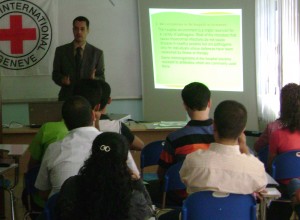
Dr. Jaff (standing) delivered a lecture in 2010 to a group of medical doctors and nurses in Iraq as part of a program to strengthen emergency services through training in communication and teamwork, infection control, waste management and other topics. (Contributed photo)
He discovered a serious lack of training among in-field health professionals. As a physician with the International Committee of the Red Cross, he taught triage procedures, pharmacy management, waste management and infection control to nurses and other staff members — but he also had to educate about the most basic hygiene practices. He trained emergency workers to use ambulances properly.
After studying conflict management and peace through a Rotary Club scholarship in Thailand and Cambodia and returning to the field with the Red Cross, Jaff found that it was impossible to track attacks, kidnappings and other incidents that put health-care workers in danger. Without that information, improving safety and infrastructure is unlikely.
“There is a big gap in knowledge because people aren’t communicating or sharing, and no one is looking at the problem,” he says. “We don’t know the number of people affected because we can’t collect the data. What we see, believe me, is the tiny tip of the iceberg.”
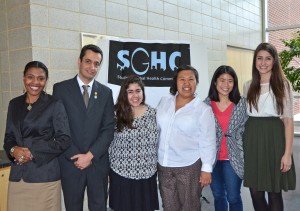
Jaff (second from left) and other members of the 2014-2015 Student Global Health Committee presented at the GillingsX talks in April. (Contributed photo)
Jaff had the necessary negotiation, facilitation and communication skills to navigate conflict zones, but if he were to affect change, he knew he needed to improve his credentials in public health. With additional Rotary Club support, he came to the Gillings School in 2013 to focus on women’s and children’s health. The specialization is important, he says, because violence now so often catches civilians in the crossfire.
His goal is to unite the objectives of public health and conflict resolution through education. Colleges of law, medicine and military science, he says, must teach students that medical missions are protected during war. Ultimately, he wants to teach local communities how to handle emergency cases, displacements and epidemic threats, as well as how to ensure that women and children have access to health care that is equal to access by men.
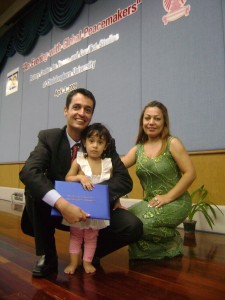
Jaff poses with his wife and daughter at his 2009 graduation from the Rotary peace and conflict resolution program at Thailand’s Chulalongkorn University. (Contributed photo)
“This is part of my dream for the future,” Jaff says. “I would love to be involved in teaching or building a connection between UNC and other organizations to address these issues. I want to use the university’s considerable educational resources to bring people together. It’s unacceptable to ignore the problem. Physically, we can’t be everywhere, but we still can do something.”
For now, Jaff, who is co-chair of the School’s Student Global Health Committee, is focused upon learning all he can and informing all who will listen about the plight of those who live and provide health care in conflict zones. In spring 2014, for example, he presented a GillingsX talk on health-care delivery in war zones. There’s no doubt that his earnestness, dedication and courage will play a big part in the change to come.
—Whitney L.J. Howell
Read more about the Rotary Peace Fellowships at tinyurl.com/ rotarypeacefellows.
GillingsX, the School’s version of the famed Technology, Entertainment and Design (TEDx) talks, was launched in 2014 by the School’s Student Global Health Committee.
Prior to 2003, Saddam’s regime prohibited Kurds from holding jobs or conducting public business. We could not speak, write or read Kurdish in my city, Khanaqin, and I could not work in the city’s hospital. On April 9, 2003, when the regime collapsed and Kurdish troops arrived, Arabic workers, including medical teams, abandoned the city.
I contacted a few local nurses at the hospital’s emergency department, and we all determined to stay because the hospital was receiving wounded people. No one was in charge; there was no water or power. Over the next days, Kurdish medical personnel arrived in the city. As things became calmer, city leaders sent me to reopen and manage the only primary health care clinic in my area. Fortunately, the local community valued the clinic and had protected and kept it intact.
I worked with National Guard troops from North Carolina to provide vaccines and medicines, control outbreaks, work with refugees and teach about health promotion. The Guard was particularly supportive in transporting medicines because the roads between Baghdad and my province were chaotic and unsecured.
—Dr. Dilshad Jaff
Carolina Public Health is a publication of the University of North Carolina at Chapel Hill Gillings School of Global Public Health. To view previous issues, please visit sph.unc.edu/cph.

